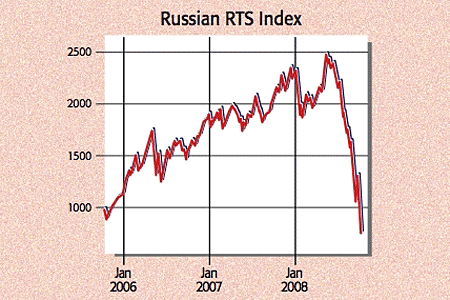
So much for decoupling. Emerging markets are having a torrid time, having fallen 39% this year compared to 24% for the S&P 500. Of 26 countries analysed by Standard & Poor’s, only one emerging market – Jordan – is still ahead for 2008. And it’s only up 0.96%. Which is why, say some analysts, there’s never been a better time to buy into emerging markets. Consider this. The MSCI Index, which tracks the sector, is trading at 10.9 times trailing earnings, says Barron’s. That’s the lowest valuation since October of 2001 and “cheap, even assuming a lower level of ‘normalised’ earnings.” The S&P 500, on the other hand, trades at 23 times trailing earnings. Russia looks particularly attractive for bargain hunters. After a 57% fall this year, the market trades on a forward p/e of 4.21. So emerging market stocks are cheap.
But cheap for a reason. As the global economy weakens, waning demand for consumer goods has hurt economies that manufacture and export them, such as China. Slowing demand has also hammered commodity prices. The Reuters-Jefferies CRB Index, which tracks 19 commodities, has fallen by 43% from its 3 July peak, according to Bloomberg. This has been particularly painful for the likes of Russia and Brazil, who are heavily dependent on the export of resources such as oil and metals. On Monday, both markets were shut, as Russia’s Micex index fell 19% and Brazil’s Bovespa index by 15%. The Neptune Russia & Greater Russia fund is down 43.7% this year, while the BlackRock Latin American Investment Trust has fallen by 39%.
And as the turmoil in the financial markets spreads, emerging markets have not proved to be safe havens. Investors are still pulling money out in favour of ‘safe’ dollar-denominated US government debt. A key measure of investors’ risk aversion, the spread between American treasuries and emerging market debt, is now at 4.41%, says JP Morgan, the highest since June 2004. While in the longer term we expect emerging markets to continue to grow strongly, the global recession isn’t going to pass them by. As Albert Edwards at Société Générale warns, with its dependence on consumer spending, and shaky banking system, “China is going into recession as well. This is going to catch investors off guard.” Meanwhile, Ambrose Evans-Pritchard points out that Russia has become so “addicted to the oil bonanza, ratcheting up spending so quickly that it may now need prices to stay above $90 to fund spending plans”. Even Brazil, one of our favourite emerging markets, is too dependent on resource stocks to buck the trend. Expect emerging markets and emerging market funds to get even cheaper in the coming months.